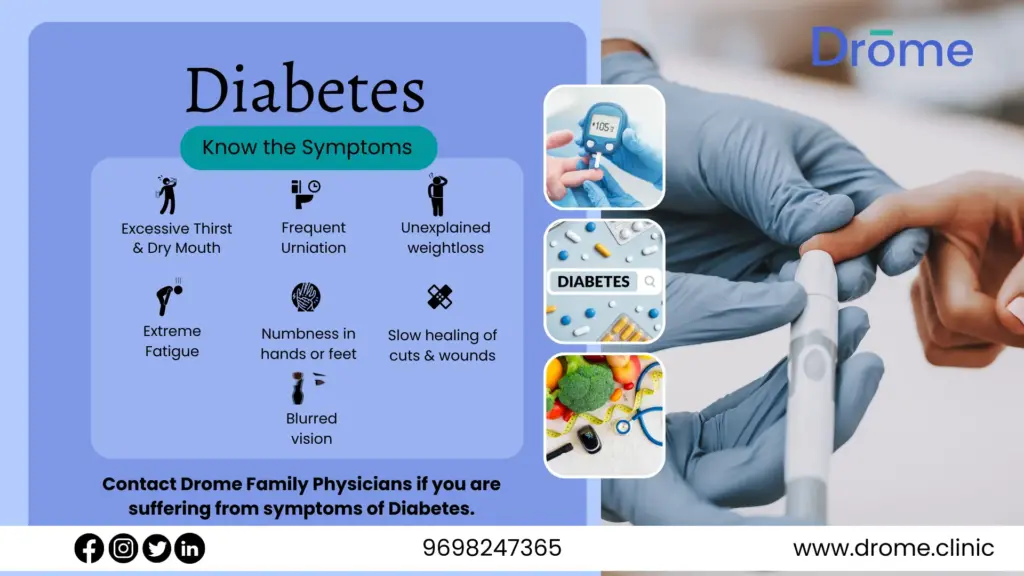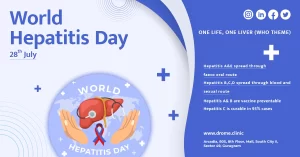Understanding Diabetes
Diabetes is a chronic health condition that affects millions of people worldwide and is particularly prevalent in countries like India, where lifestyle and genetic factors contribute significantly to its incidence. Understanding diabetes, its types, causes, and symptoms can help in managing or even preventing Diabetes.
What is Diabetes?
Diabetes is a metabolic disorder characterized by high blood sugar (glucose) levels. It occurs when the body either does not produce enough insulin (a hormone that regulates blood sugar) or cannot effectively use the insulin it produces. Most forms of diabetes are chronic (lifelong).
Risk factors:
Type 1 diabetes is thought to be caused by an immune reaction (the body attacks itself by mistake). Known risk factors include:
Family history: Having a parent, brother, or sister with type 1 diabetes.
Age: One can get type 1 diabetes at any age, but it usually develops in children, teens, or young adults.
Risk for type 2 diabetes increases if a person:
- Has prediabetes
- Is overweight
- Is 45 years or older
- Has a parent, brother, or sister with type 2 diabetes
- Is physically active less than 3 times a week
- Has ever had gestational diabetes (diabetes during pregnancy)
Types of Diabetes
There are several types of diabetes. The common types are:
Type 1 Diabetes: An autoimmune condition where the body attacks insulin-producing cells in the pancreas. It’s usually diagnosed in children and young adults, but it can develop at any age.
Type 2 Diabetes: More common and typically seen in adults over the age of 45, but is increasingly occurring in younger age groups due to lifestyle factors.
Gestational Diabetes: Develops during pregnancy and usually disappears after giving birth, but it can increase the risk of developing type 2 diabetes later in life.
Other types of Diabetes:
Type 3c diabetes: This form of diabetes happens when the pancreas experiences damage (other than autoimmune damage), which affects its ability to produce insulin. Pancreatitis, pancreatic cancer, cystic fibrosis and hemochromatosis can all lead to pancreas damage that causes diabetes.
Maturity-onset diabetes of the young (MODY): MODY, also called monogenic diabetes, happens due to an inherited genetic mutation that affects how the body makes and uses insulin. There are currently over 10 different types of MODY Brittle diabetes: Brittle diabetes is a form of Type 1 diabetes that’s marked by frequent and severe episodes of high and low blood sugar levels. This instability often leads to hospitalization.
What causes diabetes?
Too much glucose circulating in the bloodstream causes diabetes, regardless of the type. However, the reason why blood glucose levels are high differs depending on the type of diabetes.
Causes of diabetes include:
- Insulin resistance: Type 2 diabetes mainly results from insulin resistance. Insulin resistance happens when cells in muscles, fat and liver don’t respond as they should to insulin.
Several factors and conditions contribute to varying degrees of insulin resistance, including obesity, lack of physical activity, diet, hormonal imbalances, genetics and certain medications. - Autoimmune disease: Type 1 diabetes occurs when the immune system attacks the insulin-producing cells in pancreas.
- Hormonal imbalances: During pregnancy, the placenta releases hormones that cause insulin resistance, which may lead to development of gestational diabetes Other hormone-related conditions like acromegaly and Cushing syndrome can also cause Type 2 diabetes.
- Genetic mutations: Certain genetic mutations can cause MODY(maturity onset diabetes of the young) and neonatal diabetes.
Symptoms of Diabetes
Common symptoms include:
- Frequent urination
- Excessive thirst and dry mouth
- Unexplained weight loss
- Extreme fatigue
- Blurred vision
- Numbness or tingling in hands or feet
- Slow healing of cuts and wounds
Conclusion
Knowing the causes and symptoms of Diabetes is essential in raising the awareness about Diabetes. In the next Blog we will discuss about the complications and management of Diabetes.
Connect Drome Family Physicians if you are suffering from symptoms of diabetes.




